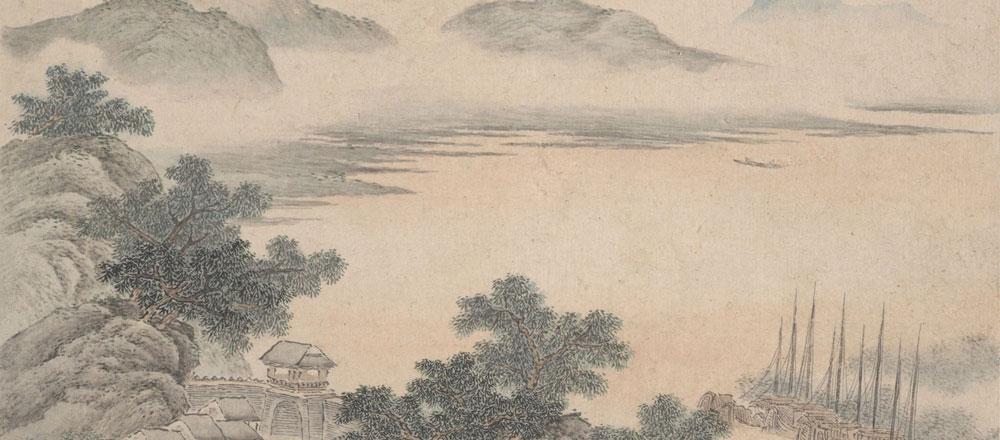In ancient poems, the moon has a rich cultural connotation, it symbolizes eternity, Zhang Ruoxuan in the moonlit riverside, wrote "life generations are infinite, the river and the moon look similar every year"; it carries people's nostalgia, Du Fu in homesickness, wrote "dew from tonight white, the moon is the hometown Of Ming"; it reminds time, Ouyang Xiu wrote "the moon on the willow head, people about after dusk". The Tang Dynasty poet Zhang Jiuling also looked at the moon lyrically and wrote a poem "Autumn Sunset Looking at the Moon", the original text is as follows:
Qingyi River City Moon, streamers of light and miles.
Thinking is like a dream, looking at each other in the court.
Pure moss dew, depressed yellow leaf wind.
Emotionless, frequent Gui Hua empty.

"Qingyi Jiangcheng Moon, streamers of light and miles", the moon of Jiangcheng is so clear and far away; the moonlight that flows like water is the same. On an autumn night, the poet was admiring the moon in the courtyard, at this time, the moon was in the sky, and the bright moonlight shrouded the entire river city. The poet looks at it with all his eyes, and beyond his vision, it is still the world under the moonlight of Qingming. Therefore, the poet could not help but associate that the place thousands of miles away should also be a general scene like this moonlit river city. With the moonlight, the poet's thoughts drifted in the silhouette of space, and in an instant, the indescribable thoughts took shape.
"Thinking is like a dream, looking at each other in the court", the people and things I miss seem to be in a dream; in the courtyard, alone with the bright moon. The poet speaks to the moon late at night because there is an irrepressible longing in his heart, and the person he misses is not in front of him, the things he is thinking about cannot be realized, everything seems to be in a dream, no one listens, no one can speak. Therefore, the poet walked in the moon late at night, looking at the bright moon for a long time in the courtyard, the moonlight was like water, and his heart was like frost. The poet wanted to pour out his heart to the moon, but the moon was silent. On this moonlit night, the poet and the moon, relatively silent.
"Bright moss dew, depressed yellow leaf wind", the crystal dew on the moss reflects the bright moonlight; the autumn wind blows off the yellow leaves. The autumn night is cold, and drops of dew have condensed on the moss. These crystalline dewdrops reflect the bright moonlight and attract the poet's attention. At a glance, the poet felt the coldness of the dew. Even at night, the autumn wind did not stop, it blew through the branches of the trees in the courtyard, and the yellow leaves fell with it. Late at night, the autumn scenery made the poet feel even more cold, and added a little melancholy to the poet's heart.
"With no words, frequently make Gui Hua empty", I have deep feelings in my heart but have no opportunity to express them, and I have failed to live up to the beautiful moonlight many times. On this moonlit night, the poet is always lonely, he is full of heart, but there is no listener. In the end, the poet can only bury the sorrow of wanting to say goodbye deep in his heart, chew alone, and secretly mourn. Because of his heart, even if the moonlight tonight is clear and far away, the poet is not in a good mood to appreciate the moon. For the poet, this has happened more than once, because for a long time in a state of sorrow and full of sorrow, the poet has failed to live up to the beautiful moonlight many times.
In this poem, the poet begins with the moonlight and ends with the moonlight. This autumn night, the moonlight shines brightly, and the bright moonlight triggers the poet's melancholy, but due to the barrier of the actual conditions, the poet cannot see the people he wants to see, cannot do what he wants to do, can only look up at the moon, and silently pour out his full stomach of sorrow to the moon, but he cannot get a response.